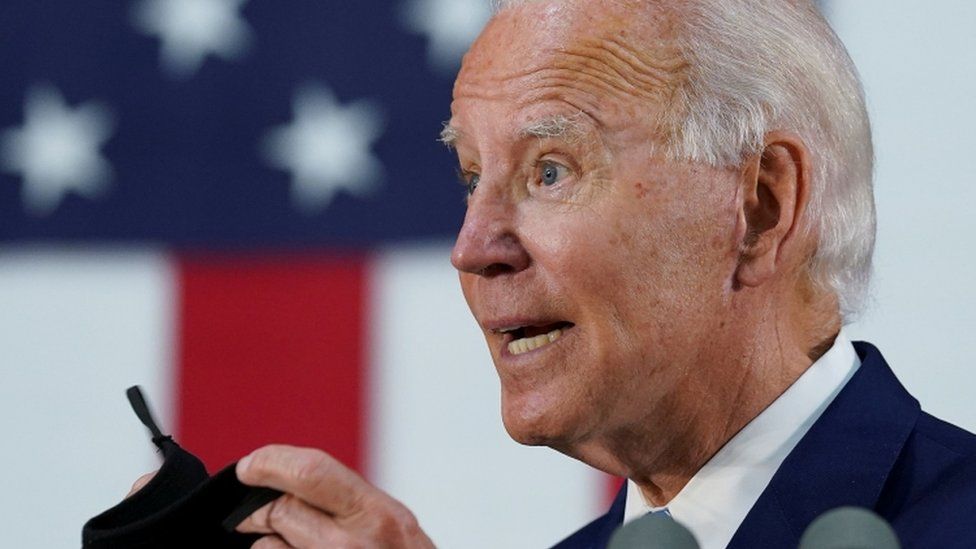Coronavirus: Biden vows to reverse Trump WHO withdrawal
- Published

US Democratic challenger Joe Biden has said he will reverse President Donald Trump's move to withdraw from the World Health Organization (WHO) "on day one" if he wins November's election.
Mr Trump formally began the pull out on Tuesday after signalling the move in May. He said the WHO was under China's control during the coronavirus crisis.
The process could take at least a year.
Mr Trump currently trails Mr Biden in the race for president by a margin of more than 10 percentage points.
Analysts have urged caution in interpreting the polls, but Mr Biden's lead is far greater than that of Mr Trump's 2016 opponent Hillary Clinton at the same point in the campaign.
Many voters are concerned by the administration's handling the pandemic and its economic fallout.
There have been almost three million confirmed cases of the virus in the US and more than 130,000 deaths, far more than in any other country. Meanwhile, tens of millions have lost their jobs.
What did Mr Biden and others say?
In a tweet on Tuesday evening, Mr Biden said the US was better off working within the international community on global health issues.
"Americans are safer when America is engaged in strengthening global health," he said.
"On my first day as President, I will rejoin the @WHO and restore our leadership on the world stage."
Democrats in Congress confirmed that the legislature had been notified of the president's decision.
Robert Menendez, the leading Democrat on the Senate Foreign Relations Committee, wrote on Twitter: "Congress received notification that POTUS officially withdrew the US from the WHO in the midst of a pandemic.
"It leaves Americans sick and America alone."
China also deplored Mr Trump's move, saying it would hit poorer countries hardest.
"This decision of the United States undermines international efforts and will have grave implications - especially for the developing countries that urgently need international support," said Foreign Ministry spokesman Zhao Lijian.
"We urge the United States to fulfil its international responsibilities and obligations and to show the responsibility of a big country."
What led to this move?
Explaining the decision, a senior US administration official told CBS News that Washington had detailed the reforms that it wanted the WHO to make and engaged with it directly, but that the WHO had refused to act.
"Because they have failed to make the requested and greatly needed reforms, we will be today terminating our relationship," the official was quoted as saying.
Mr Trump first announced in April that he was going to halt US funding for the WHO unless it undertook "substantive improvements" within 30 days.
Then in late May he said the US "will be terminating our relationship with the World Health Organization and directing those funds" to other global public health charities.
Mr Trump has repeatedly criticised China's early handling of the outbreak
"The world is now suffering as a result of the malfeasance of the Chinese government," he said, adding that China had "instigated a global pandemic".
The president accused China of pressurising the WHO to "mislead the world" about the virus, without giving evidence for his allegations.
"China has total control over the World Health Organization," the president said.
What will the consequences be?
The US is the global health agency's largest single contributor, providing more than $400m (£324m; €360m) in 2019, around 15% of its total budget.
Under a Congress resolution in 1948, the US can withdraw but must give a year's notice and should pay outstanding fees, although it is unclear where Mr Trump stands on that.
The withdrawal will call into question the WHO's financial viability and the future of its many programmes promoting healthcare and tackling disease.
Other countries, including Germany and the UK, have said they have no intention of withdrawing funding from the WHO, which is coordinating a global initiative to develop a vaccine against Covid-19.
What is the WHO - and who funds it?
- Founded in 1948 and based in Geneva, Switzerland, it is the UN agency responsible for global public health
- Has 194 member states, and aims to "promote health, keep the world safe and serve the vulnerable"
- Involved in vaccination campaigns, health emergencies and supporting countries in primary care
- Funded by a combination of members' fees based on wealth and population and voluntary contributions
- A SIMPLE GUIDE: How do I protect myself?
- HOPE AND LOSS: Your coronavirus stories
- VIDEO: The 20-second hand wash
- STRESS: How to look after your mental health
- Published24 March 2020
- Published17 May 2020